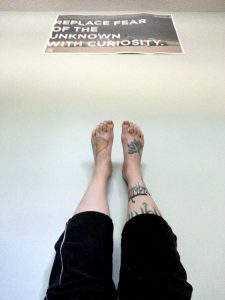Last week was very busy. I substituted for two yoga classes and I had a client session. My spouse has been on another business trip, which means I’m solely seeing to the needs of our two dogs and two cats. I made time to help friends who are experiencing a family crises. This past Saturday I taught a new workshop for the first time, this one felt especially stressful for me.
Over the past year I’ve developed a few new workshops and the most recent one is called Generous Compassion. Neither of the other two new workshops this year filled me with as much anxiety. My first one, Hatha Yoga for Spine Health, is such a deeply personal and familiar topic that it doesn’t bring up anxiety. My Abundant Gratitude workshop I really wrote up last year and prepared for, but it was cancelled; when I gave it last month it felt pretty comfortable,with only a few “first time” jitters.
This latest one however… I struggled to finish the handouts. I agonized over the writing activities. I felt waves of physical unease and agitation. I felt very far from my researched topic of compassion!
As I’ve gone deeper into my personal yoga practice, and through trauma therapy, I’ve learned how to interpret the flood of somatic sensations to the message trying to be expressed. For years I’ve felt like I’m “doing it wrong” because I don’t have that “voice” of the inner critic. At first all I get is a bodily sense of unease, anxiety rising, shame seeping forth, without any way to control it. I once burst out in therapy that I wished I had some voice in my head I could argue with, instead I just would be sometimes debilitated by the overwhelming message of, “WRONG!”, from my body. I still don’t have the sense of a “negative voice” I deal with, it is still a somatic experience, I’ve just learned that I can follow the body sensation until the energy of it resolves into a meaning. It is more intuitive, the language of felt energy moving, which has made it a challenge for me as I’m highly analytical and verbal.
What I finally realized what that I felt like a fraud writing about cultivating self-compassion. It is my old friend, Imposter Syndrome, coming around to slow me down. Once I was able to identify and direct some kindness at those tender feelings I managed to get my handouts finished and printed. The workshop went well, the time flying by once I began teaching. I was reminded during the workshop, and after by a friend, that my own struggles with self-compassion give me insight that I might not have access to if it came naturally to me.
My students and I touched on the topic of giving and receiving kindness, how this is an act with two parts. There is the compassionate act of giving kindness of helping another, in order for that to fully work there must be a compassionate act of receiving. If we give excessively, without being compassionate to our own needs, it isn’t sustainable. I know from personal experience; I nearly exhausted myself to the point of almost being hospitalized trying to help my Mother. I’ve lost a friend to depression when they felt worthless when their illness made them unable to “contribute” to their community.
On that continuum, some people feel challenged to accept kindness and help from others because they have a history where kindness always had a hidden price. They have absorbed the message that they only were of value if they produced something, or gave their energy. My abusive family of origin had a kind of unspoken “tally sheet” that kept track of who owed who a favor, and how big a favor it was. My personality-disordered Mother enforced my role as her caretaker and confidant through inconsistent rewards and ferocious punishments; the legacy of that being my adult tendency of reserve and occasional suspicion of kind offers. It has taken me decades to see my own inclination to reject help, not ask for help, and to pull away from gestures of tenderness, like people offering hugs. I like giving hugs, but for many years I was uneasy at receiving them.
In the midst of this week close friends have been having a family crises. Earlier in the week they’d asked if someone would come cook up groceries bought before the crises began. This would prevent wasting the food as well as avoid the costs of eating more prepared food. I knew I’d be very tired, so I asked a mutual friend if they would drive us both over, allowing me to conserve energy to make dinner. Together we also took care of dishes, making it easier to prepare food. It was the perfect example of compassion where kindness, interconnection, and mindfulness comes together to benefit everyone involved. They were willing to ask for this help, “Please cook some of the food I purchased before this crisis began”, I was willing to do that for them. I was comfortable asking another friend to drive, willing to receive that kindness, and my friend was willing to do that and help with household tasks while I cooked.
It is that willingness that compassion fuels. We don’t all need limitless quantities of this compassion, we don’t have to exhaust ourselves giving our energy to the care of others. We just have to be willing to share what we’re able, when we’re able. We have to be willing to ask for the help and attention we need, when we need it. We need to see one another with compassion and empathy, then act on it.



Karuna (Compassion) is so important in society. Love this post!
Thank you so much! Compassion is a vital fuel for how we live together in wellness.